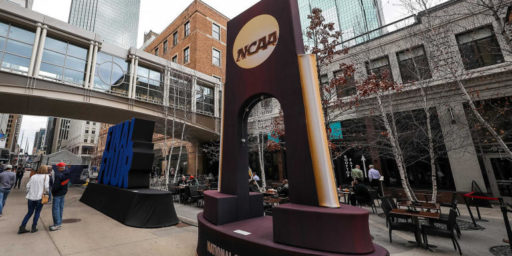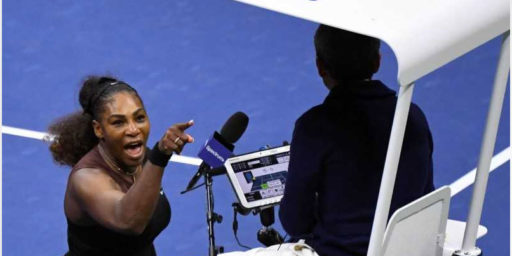Blogger Tossed From NCAA Baseball Tourney
A reporter was tossed from the college baseball tournament for live-blogging a game.
A reporter was ejected from an NCAA baseball tournament game for submitting live Internet updates during play. Brian Bennett, a writer for The (Louisville, Ky.) Courier-Journal, was approached Sunday by an NCAA representative in the bottom of the fifth inning and told that blogging from an NCAA championship event is against NCAA policies.
Bennett had done live blogging during Louisville’s super regional games against Oklahoma State in the previous two games of the three-game series. The representative revoked Bennett’s credential Sunday and asked him to leave the game.
“It’s clearly a First Amendment issue,” said Bennie Ivory, the newspaper’s executive editor. “This is part of the evolution of how we present the news to our readers. It’s what we did during the Orange Bowl. It’s what we did during the NCAA basketball tournament. It’s what we do.” The newspaper’s lawyer, Jon L. Fleischaker, added: “I think there’s the potential for some action. We’re still talking about it.”
NCAA spokesman Bob Williams said Monday that Bennett was asked not to blog about game action before Sunday’s game. “In a nutshell, we asked the blogger repeatedly not to cover it in that manner, because it violates the policy, and he continued, and his credential was revoked,” Williams said.
Ivory is right that, in the Internet age, people expect information instantaneously. The NCAA policy here is swimming against the tide and, given how little interest there is in college baseball compared to other sports, pretty short-sighted.
That said, it’s simply idiotic to proclaim this a First Amendment issue. The government isn’t censoring the press here. Rather, a business is making a decision about how to control access to a private good. They have every right to do that.
via OTB Sports





As much as I think the NCAA is a really boneheaded about this I’m not sure where the 1st amendment argument is, “Congress shall make no law…”. If the government was telling this guy he can’t blog … sure, the constitution is clear. But the NCAA is not congress and even if you want to make the case that the NCAA is not a private organization, you still have a big hill to climb to get a constitutional beef out of it.
I mean here is an organization that tells students that if you take money for playing sports they can prevent you from taking the field on behalf of your school. Try doing that with a business school undergrad who is doing an internship for GE. If that ain’t a constitutional issue then nothing is really.
Bottom line is the NCAA has no responsibility to the readers of any news organization. At worst they are boneheaded but geez, this is the USA, boneheadedness is a national pastime.
I’ve seen this incident reported a few places now, and there’s something I still don’t get. The guy had a legitimate press pass – he was sanctioned by U of L and the NCAA to report the friggin’ game. Is the NCAA policy that this one specific method of doing so – typing updates into a computer that are then immediately posted live to the public – is not allowed?
If that’s the case, it might actually qualify as a freedom of the press issue…
My guess, from having heard and read about other policies like this, is that they are giving certain broadcasters exclusive rights to air live coverage of playoff games. Other press are allowed to report on the game but only after conclusion.
So, presumably, Bennett would have been free to keep a running diary of his thoughts on the game in a Word document and then paste them into his blog and publish after the final buzzer went off.
Is information a private good? If I consume it does your abilit to consume it vanish? Economist Jean-Jaques Laffont would argue this makes the good a public good.
Presumably, rights to broadcast it are.
If, say, ESPN pays for exclusive rights to radio, television, and Internet live coverage, the NCAA can charge them something for that. The contract would then call for reasonable enforcement of that exclusivity.
Whether or not information is a private good (and as James correctly points out, it is) is utterly inconsequential to whether this is a First Amendment issue.
In order for there to be any controversy under the Constitution, the press must be restricted by state action. Private entities can engage in state action in a limited number of situations, usually either where they provide functions traditionally reserved for governments (like running a town), or where the state has somehow ratified the restriction by supporting the organization (usually either by instilling state power into a private entity, or through financial aid). The NCAA could only reasonably qualify under the latter standard, but I don’t know enough about the government’s mandate and/or support of NCAA functions to know if there is any leg to stand on with regard to a First Amendment challenge here. In any case, I seriously doubt that it’s worth it for the blogger to take this issue to court.
Remember the Constitution prohibits Congress from infringing on freedom of speech, not that the First Amendment protects citizens only from government infringements on that freedom.
(Here’s an article on free speech in “quasi-public” places…)
So, the question here is, does the NCAA’s policy inhibit our “natural” right to a free traffic of ideas? I suspect that, because the game is taking place in a public venue and that it is a newsworthy event, the blogging would be protected under our rights to free speech — unless all the entrants to the park were required to fill out a non-disclosure form or something prohibiting them specifically to report on the game in progress.
Think of it like a shooting that took place in a mall. Would journalists be prohibited from reporting on the shooting because it took place on private property?